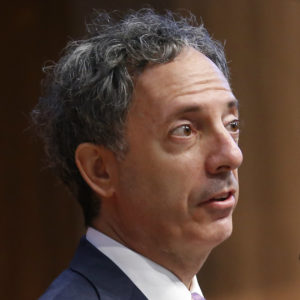Plato’s Republic
Study Plato’s Republic, perhaps the greatest work of political philosophy ever written.
Summer 2021
Washington, DC
Following our quarantine period, Political Studies fellows will convene for our first two courses, held over morning and afternoon sessions. Our morning session is devoted to Aristotle’s Nicomachean Ethics and Politics. Through a close reading of these texts, fellows will investigate the relations between virtue and happiness and virtue and politics. Most of the week will focus on the Nicomachean Ethics and its study of the human good before following this study into the Politics, particularly its discussion of the kind and quality of regimes.
Image: Charles Laplante, Aristotle and his pupil Alexander, 1866
Robert Bartlett on Aristotle

Robert C. Bartlett is the Behrakis Professor of Hellenic Political Studies at Boston College. His principal area of research is classical political philosophy, with particular attention to the thinkers of ancient Hellas, including Thucydides, Plato, and Aristotle. He is the co-translator of a new edition of Aristotle’s Nicomachean Ethics.

Robert C. Bartlett is the Behrakis Professor of Hellenic Political Studies at Boston College. His principal area of research is classical political philosophy, with particular attention to the thinkers of ancient Hellas, including Thucydides, Plato, Xenophon, and Aristotle.
He is the author or editor of eight books, including Sophistry and Political Philosophy: Protagoras’ Challenge to Socrates, The Idea of Enlightenment, Plato’s Protagoras and Meno, and Xenophon’s The Shorter Socratic Writings. He is also the co-translator of a new edition of Aristotle’s Nicomachean Ethics (University of Chicago Press, 2011). He has also published articles in the American Political Science Review, American Journal of Politics, Journal of Politics, Review of Politics, and other leading scholarly journals.
Before coming to Boston College, Robert Bartlett served as the Arthur M. Blank/National Endowment for the Humanities Distinguished Teaching Professor at Emory University. He is a graduate of the University of Toronto and holds an MA in Classics and a Ph.D. in Political Science from Boston College.
Recommended Reading:
Readings:
Reading Questions:
Readings:
Reading Questions:
Readings:
Reading Questions:
Readings:
Reading Questions:
Readings:
Reading Questions:

Bryan Garsten
Bryan Garsten is Professor of Political Science at Yale University. He writes on questions about political rhetoric and deliberation, the meaning of representative government, the relationship of politics and religion, and the place of emotions in political life.

Jenna Silber Storey
Jenna Silber Storey is a senior fellow in the Social, Cultural, and Constitutional Studies department at the American Enterprise Institute (AEI), and co-director of AEI’s Center for the Future of the American University. She is concurrently an SNF Agora Fellow at Johns Hopkins University, and a research fellow at the Civitas Institute at the University of Texas at Austin. She also serves on the executive committee of the Alliance for Civics in the Academy.

Amy A. Kass
Amy Apfel Kass (1940 – 2015) was a senior fellow at the Hudson Institute, Senior Lecturer Emerita in the humanities at the University of Chicago, and coeditor of What So Proudly We Hail: The American Soul in Story, Speech, and Song. She was an award-winning teacher of classic texts.

Leon R. Kass
Leon R. Kass, M.D., is the Addie Clark Harding Professor Emeritus in the Committee on Social Thought and the College at the University of Chicago and the Madden-Jewett Chair at AEI. He was the chairman of the President’s Council on Bioethics from 2001 to 2005. He has been engaged for more than 40 years with ethical and philosophical issues raised by biomedical advances and, more recently, with broader moral and cultural issues.

Peter Berkowitz
Peter Berkowitz is the Tad and Dianne Taube Senior Fellow at the Hoover Institution, Stanford University. He studies and writes about, among other things, constitutional government, conservatism and progressivism in America, liberal education, national security and law, and Middle East politics.
Thomas Chatterton Williams
Thomas Chatterton Williams is a staff writer at The Atlantic and the author of Losing My Cool and Self-Portrait in Black and White. He is a Visiting Professor of Humanities and senior fellow at the Hannah Arendt Center at Bard College, a 2022 Guggenheim fellow, and a visiting fellow at AEI. He was previously a contributing writer at The New York Times Magazine and a Columnist at Harper’s.